A Sense Of Adventure
Psychologists at the University of Bhunkum have found that adding the words ‘at night’ or ‘by moonlight’ to any activity increases its AQ (Adventure Quotient) by an incredible 308 percent.
Happy Friday…
Happy Solstice, Happy Christmas and indeed happy Edition 300 of this newsletter! That’s almost too much happiness for the start of one email, so let’s keep the energy going and get straight into the CONTENT.
A Sense of Adventure
🟢🟢🟢🟢🟢🟢🟢🟢🟢🟢🟢🟢🟢🟢🟢🟢🟢🟢🟢🟢🟢🟢🟢🟢🟢
🟢🟢🟢🟢🟢🟢🟢🟢🟢🟢🟢🟢🟢🟢🟢🟢🟢🟢🟢🟢🟢🟢🟢🟢🟢
🟢🟢🟢🟢🟢🟢🟢🟢🟢🟢🟢🟢🟢🟢🟢🟢🟢🟢🟢🟢🟢🟢🟢🟢🟢
🟢🟢🟢🟢🟢🟢🟢🟢🟢🟢🟢🟢🟢🟢🟢🟢🟢🟢🟢🟢⚪⚪⚪⚪⚪
Leaving the car at the Picket Plain viewpoint, I stumbled quickly through heath and gorse and mud, using the light of the moon to see the pathshine and feeling my way over the contours.
I worked my way over the valleys and into the woods, the fractals of the trees in their winter coats standing brilliantly against the sky.
As the year scribbles its way to a close, and penned in by the invisible boundaries of good health, I’ve spent the last week sketching out adventure close to home.
I’m often asked what kind of experience counts towards my 100 Days of Adventure challenge. The answer isn’t very satisfying: you know an adventure when you have one. You can’t always predict it; it’s something you feel.
That’s why we call it having ‘a sense of adventure’.
Darkness definitely eases back the threshold of adventure. Indeed, psychologists at the University of Bhunkum have found that adding the words ‘at night’ or ‘by moonlight’ to any activity increases its AQ (Adventure Quotient) by an incredible 308 percent.
Getting lost in the woods: annoying
Getting lost in the woods at night: adventure
Climbing a tree: fun
Climbing a tree by moonlight: adventure
See? This is why wintertime is the best time for adventures: darkness falls in late afternoon, leaving ample time for adventure before cocoa and bed.
This reframing turns our usual seasonal preferences on their head: the long summer evenings are a barrier to adventure, not an opportunity. Winter is where we get our kicks, sunset marking time to shut the laptop and pull out the map.
Equal parts terror and wonder
Feeling the sublime sense of awe is pretty good for us humans: falliable scientific experiments have shown that these wow-experiences can make us happier, healthier, brainier, humbler and kindlier.
And nature is the ultimate awesome experience, equal parts terror and wonder.
That’s what I thought as I rambled through the Purbecks on a foggy Sunday night, anyway.
The Purbecks are famed for their crumbly white cliffs, dropping sheer into the rocky water from the pleasant and abrupty terminated grassy heath above.
On a clear day, it looks a lot like this:
For daredevils, there is a narrow spit of land connecting to a lonesome chalky pillar. The cliffs tumble away either side and you can look down into your doom and see it swirling in the foam below.
On a clear day, it looks a lot like this:
On a wintery night, when the sea fog has rolled in after dark, it doesn’t look anything like this at all.
All I can see, as I creep out into the void, is the ghostly white of the chalk and the angry foam of the waves.
I lie down, nothingness either side of me, wind howling above, sea raging below, and I laugh. This is why they named this place for the devil: Old Harry Rocks.
Cut off from the solid ground of the heath, I imagine a shadowy figure looming at the end of the lace thin path. Cackling with delight, I crawl back on my hands and knees.
That’s awe.
Ignore your smoke alarm and look up
Of course, awe is much more safely experienced by simply looking up on a clear night. The key word there is ‘night’. This cannot be done during the daytime. Score another point for winter’s early evenings.
(Yes, ‘clear’ was also a key word. Unless otherwise stated, assume all my words are key.)
I’m sure we’ve all stared up into a wintery sky and felt very small. Nothing turns burning the toast into the insignificant annoyance that it is faster than boggling over the number of stars in the universe.
So ignore your smoke alarm for a second and imagine: how many stars are there in the Universe? More than there are grains of sand in the world.
Having said that, more prosaically, on a night like tonight, using the eyes that evolution gave you, you might see anywhere up to 4,548 stars — although that number will depend greatly on light pollution.
Each one of these stars is its own solar system, each one is home (potentially) to billions of lifeforms, each one enjoying the unfathomable richness of your own earthly experience. Take that in for a second.
Now switch off your smoke alarm.
Given that it’s nighttime, the closest star you can see in the northern hemisphere is Sirius, the Dog Star, about 81 trillion kilometres away.
The furthest star that humans have ever clapped eyes upon is called Icarus, and it sits in the night sky about 5 billion light-years away from Earth. A light-year is more than 9 trillion kilometres.
Our galaxy, the Milky Way, holds about 300 billion stars and the billions of other galaxies scooting along around us mean that there are about 70 billion trillion stars in the observable universe.
Beyond that..?
Silence, Senses, Solitude
But the value of nighttime is not only the ghoulish darkness or the Mills & Boon soft celestial lighting: nighttime, especially in winter, is also a time of solitude.
I met no earthly being but horses during two evening rambles through the New Forest and the Purbecks this week. On two similar daytime adventures in the Forest and the Heath, I could hardly move for chirpy off-schoolchildren and professional dog walkers.
That solitude brings with it the gift of silence — which is itself the gift of sensory abundance, for even the most silent night is full of sound.
The stochastic comforts of matter moving through matter. The crackle of boots through leaves. The percussive snap of twigs under weight. The creak and rustle of unseen insects laying a trail.
The darkness sharpen other senses too: I smell the moss-sucking damp of the bog before my boots get wet. Movement, real or imagined, is enhanced in my peripheral vision. My skin tingles, every follicle straining for sensory input.
I followed the stars of Cassiopeia out of the woods and back up towards the A31. The mud on my jeans gave me away to the petrol station attendant.
I feel a sense of adventure.
How to navigate… in fog… at night
Your sense of adventure can be sharpened, in order of descending visibility, by haze, mist and — as I enjoyed on Sunday night in the Purbecks — fog.
As the waves of the English Channel hurled themselves onto the white cliffs below, clouds of water vapour condensed around the flecks of salt in the cold air.
I was navigating towards the obelisk of Ballard Down. To give you some idea of visibility, here’s what that imposing monument looked like at ten paces:
Definitely a night to practice my navigational instincts.
Use all your senses, starting with your common sense. Foot feel is your most reliable feedback system in fog. Sound, smell and sight are also useful and sometimes combine to make an inexplicable sixth sense: if you get a funny feeling that you might be going wrong, pay attention.
Fog is low-lying cloud, so if you need to use a torch (generally you don’t if your night vision is switched on), then hold it at hip height or lower, otherwise it’ll just reflect water vapour back in your face.
Contour lines are your best friend: you can feel them through your feet and if you’re walking up a steep hill or along a ridge you can often see a change in shadow below the line of the fog.
If you really can’t detect anything, not even a contour, lie down on the ground and see if the view is any better from there. If you’re worried about cliff edges, a crawl is safer than a walk.
Expect a discombobulating sense of vertigo if you stare into the fog for too long: keep your eyes moving and check in with solid ground every now and again.
I’ve already done all the well-wishing, but here’s another round just for you: may you find as much joy in navigating whatever weather systems come our way as the crows and gulls are finding in the sea breeze outside my window.
If you’ve enjoyed reading this newsletter and would like to send me a gift this Christmas, please forward this email to a friend and invite them to sign up.
There are 298 of us here at the moment — imagine what would happen if we hit 300!
Probably nothing except two more happy readers, but maybe, just maybe, we could go down in history for a heroic last stand at Thermopylae. Or similar.
Just spit-balling here.
Big love,
dc:

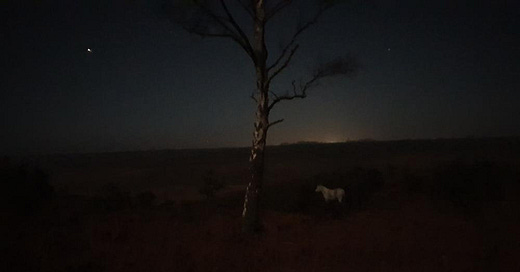



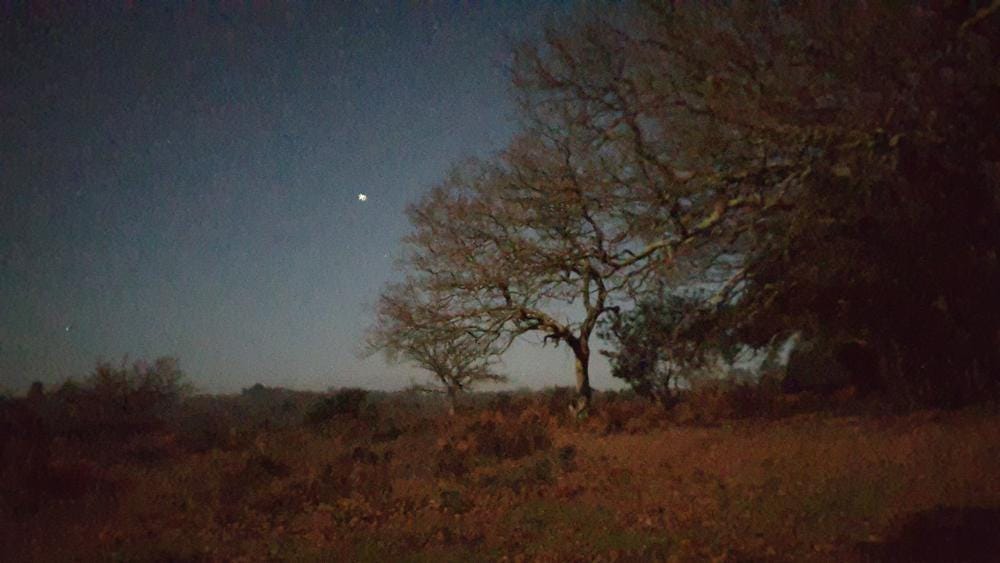
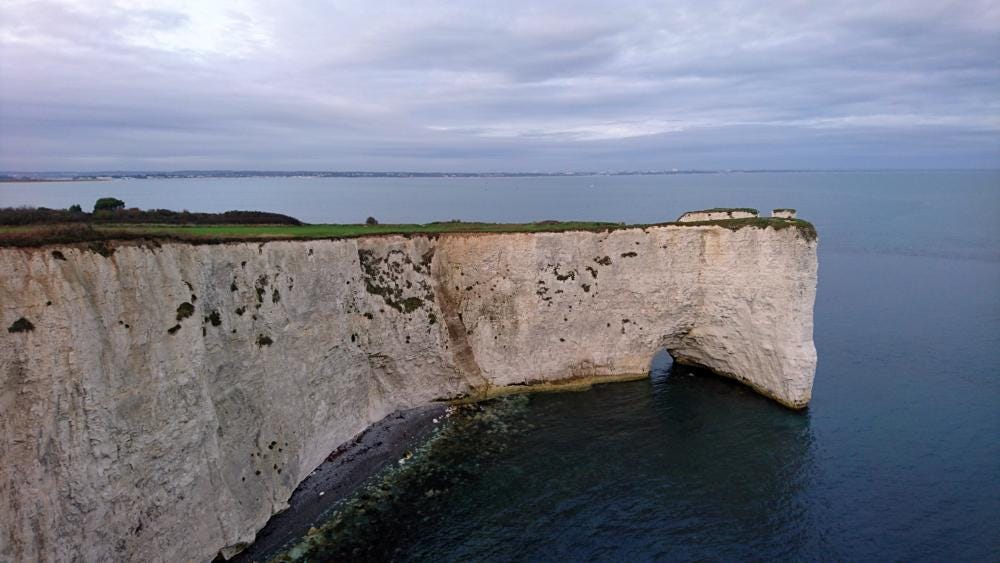
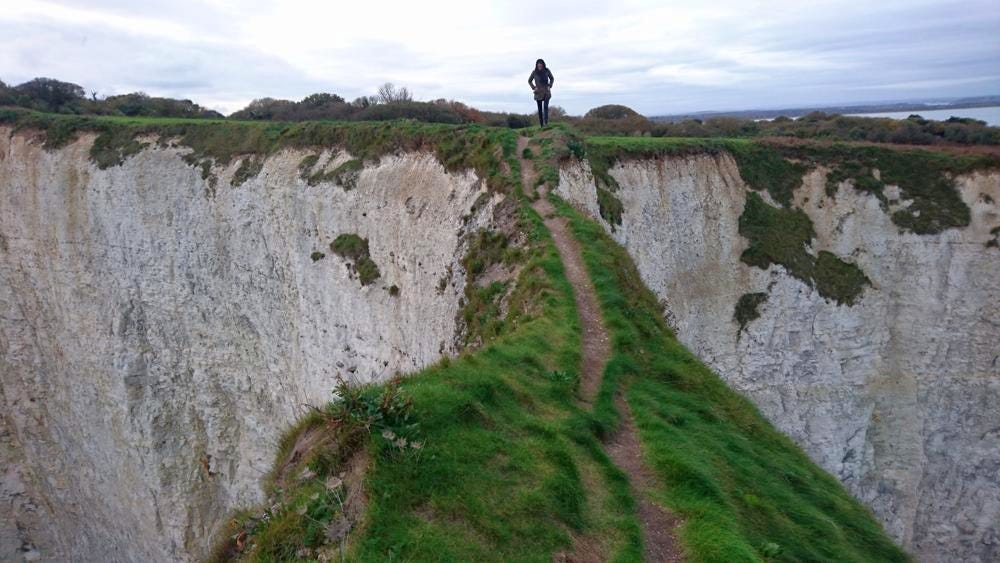

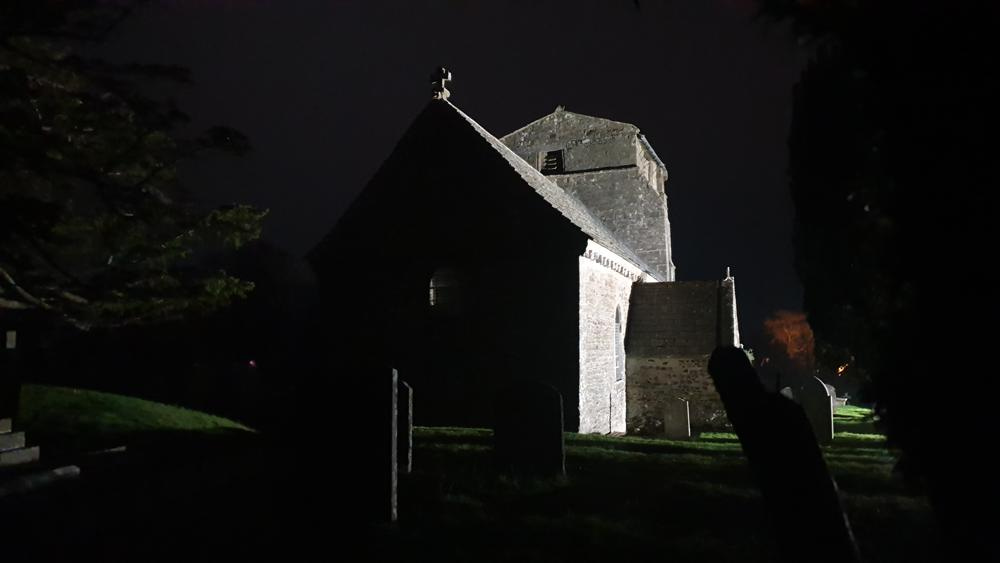

Really enjoyed this, thank you.
Night walks are such a treat. Night walks in *fog*? Ten times so. I went out in a peasouper here in Troon, wandered up the beach for a mile or so, and when I looked back, everything was gone - no town, no lights, not even a glow. But on the way back, the fog started to lift like a curtain being raised, and it was like seeing a painting come together, or an urban timelapse through history. Such a treat. I felt treated.
Also, I just read Rachel Carson's "A Sense Of Wonder" for the first time, and there's a passage that aligns with what you're writing about here. Lengthy pasted quote incoming:
>>"I remember a summer night.... It was a clear night without a moon. With a friend, I went out on a flat headland that is almost a tiny island, being all but surrounded by the waters of the bay. There the horizons are remote and distant rims on the edge of space. We lay and looked up at the sky and the millions of stars that blazed in darkness.
The night was so still that we could hear the buoy on the ledges out beyond the mouth of the bay. Once or twice a word spoken by someone on the far shore was carried across on the clear air. A few lights burned in cottages. Otherwise there was no reminder of other human life; my companion and I were alone with the stars. I have never seen them more beautiful: the misty river of the Milky Way flowing across the sky, the patterns of the constellations standing out bright and clear, a blazing planet low on the horizon. Once or twice a meteor burned its way into the earth’s atmosphere.
It occurred to me that if this were a sight that could be seen only once in a century or even once in a human generation, this little headland would be thronged with spectators. But it can be seen many scores of nights in any year, and so the lights burned in the cottages and the inhabitants probably gave not a thought to the beauty overhead; and because they could see it almost any night, perhaps they will never see it."<<